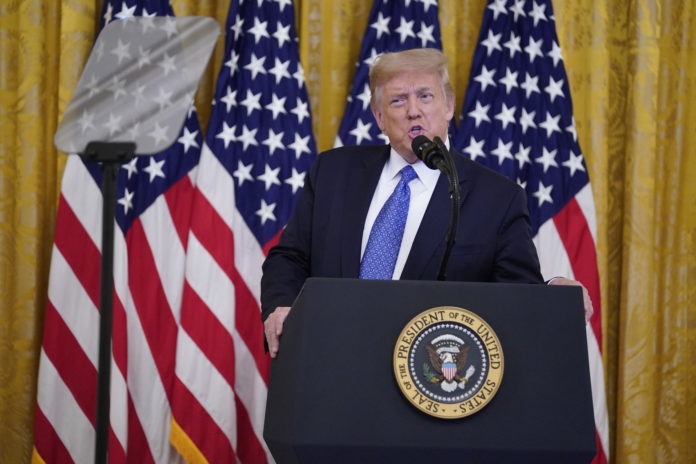
President Donald Trump announced Wednesday that he will send federal agents to Chicago and Albuquerque, New Mexico, to help combat rising crime, expanding the administration’s intervention into local enforcement as he runs for reelection under a “law-and-order” mantle.
Using the same alarmist language he has employed to describe illegal immigration, Trump painted Democrat-led cities as out of control and lashed out at the “radical left,” which he blamed for rising violence in some cities, even though criminal justice experts say it defies easy explanation.
“In recent weeks there has been a radical movement to defund, dismantle and dissolve our police department,” Trump said at a White House event, blaming the movement for “a shocking explosion of shootings, killings, murders and heinous crimes of violence.”
“This bloodshed must end,” he said. “This bloodshed will end.”
The decision to dispatch federal agents to American cities is playing out at a hyper-politicized moment when Trump is grasping for a new reelection strategy after the coronavirus upended the economy, dismantling what his campaign had seen as his ticket to a second term. With less than four months until Election Day, Trump has been warning that violence will worsen if his Democratic rival Joe Biden is elected in November, and Democrats have a chance to make the police reforms they have endorsed after the killing of George Floyd and nationwide protests demanding racial justice.
Crime began surging in some cities like Chicago, New York, and Philadelphia when stay-at-home orders lifted. Criminal justice experts seeking answers have pointed to the unprecedented moment: a pandemic that has killed over 140,000 Americans, historic unemployment, a mass reckoning over race and police brutality, intense stress, and even the weather. Compared with other years, crime in 2020 is down overall.
The plan Trump announced Wednesday expands an existing program that sent hundreds of federal agents to Kansas City, Missouri, after a 4-year-old boy’s shooting death to help quell a record rise in violence. Sending federal agents to help localities is not uncommon; Attorney General William Barr announced a similar surge effort in December for seven cities with spiking violence. But this effort will include at least 100 Department of Homeland Security Investigations officers who generally conduct drug trafficking and child exploitation investigations, in addition to personnel under the Justice Department umbrella.
DHS officers have already been dispatched to Portland, Oregon, and other localities to protect federal property and monuments as Trump has lambasted efforts by protesters to knock down Confederate statutes.
Local authorities there have complained that agents have exacerbated tensions on the streets, while residents have accused the government of violating their constitutional rights. Indeed, civil unrest escalated after federal agents were accused of whisking people away in unmarked cars without probable cause.
Since the racial justice protests began, Trump’s campaign has leaned heavily into a pledge to maintain “law and order” as it has tried to tie Joe Biden to a small group of radicals and anarchists it claims is trying to destabilize America’s cities and rewrite history.
The campaign believes the push can help Trump by drumming up support from suburban and older voters who may be rattled by violent images, which have been broadcast often by conservative media outlets.
In Chicago, Democratic Mayor Lori Lightfoot, who had initially blasted the news, said the U.S. attorney’s office will supervise the additional agents joining existing federal law enforcement offices.
“If those agents are here to actually work in partnership on support of gun violence and violent cases, plugging into existing infrastructure of federal agents, not trying to play police in our streets, then that’s something different,” she said, while also accusing the president of trying to distract from scrutiny of the federal response to the pandemic.
In New Mexico, Democratic elected officials had cautioned Trump against sending in federal agents, with U.S. Sen. Martin Heinrich calling on Bernalillo County Sheriff Manny Gonzales to resign for attending the White House event.
“Instead of collaborating with the Albuquerque Police Department, the Sheriff is inviting the President’s stormtroopers into Albuquerque,” Heinrich said in a statement.
Acting Homeland Security Secretary Chad Wolf drew a distinction between the mission in Portland — to protect federal property — and the surges in Kansas City, Chicago and Albuquerque to help stop violence.
Albuquerque and Chicago will be getting millions of dollars for new officers, and the Justice Department will reimburse Chicago $3.5 million for local law enforcement’s work on the federal task force.
In Kansas City, the top federal prosecutor said any agents involved in an operation to reduce violent crime in the area will be clearly identifiable when making arrests, unlike what has been seen in Portland. Hundreds of extra agents have been sent.
“These agents won’t be patrolling the streets,” U.S. Attorney Timothy Garrison said. “They won’t replace or usurp the authority of local officers.”
Operation Legend — named after 4-year-old LeGend Taliferro, who was fatally shot while sleeping in a Kansas City apartment last month — was announced July 8.
“My one and only child who fought through open heart surgery at four months is gone due to senseless gun violence,” LeGend’s mother, Charon Powell, said at the White House. “Children are supposed to be our future and our son didn’t make it to kindergarten.”
This story has been corrected to delete an incorrect reference to more than 200 arrests being made in Kansas City; that figure includes arrests going back to December 2019.
Republished with the permission of the Associated Press.












